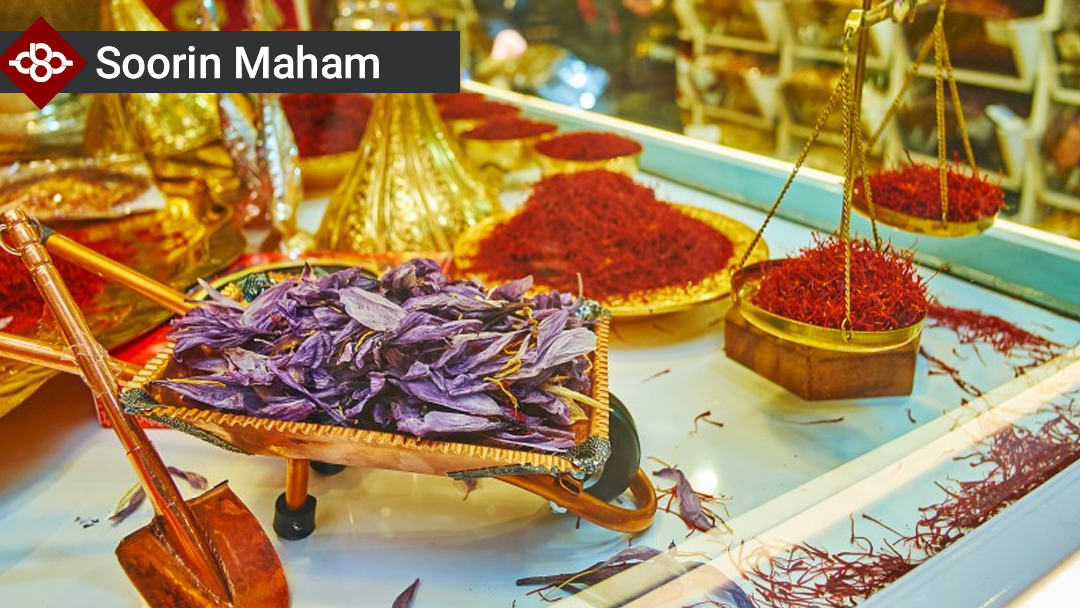Iran is the world's largest producer and exporter of saffron, often referred to as "red gold" due to its high value and labor-intensive harvesting process. In 2022, Iran exported saffron worth $121 million, making it the top exporter globally. The primary destinations for Iranian saffron include Spain, the United Arab Emirates, China, Kuwait, and India.
Also read this: Investing in Iran’s Real Estate with Soorin Maham Company
Several factors contribute to the strength of Iran's saffron market:
- Quality and Reputation: Iranian saffron is renowned for its superior quality, rich color, and strong aroma, making it highly sought after in international markets. The Crocus sativus flower, from which saffron is derived, thrives in Iran's unique climate and soil conditions, producing saffron with high levels of crocin, picrocrocin, and safranal, which are responsible for its color, taste, and aroma.
- Production Volume: Iran produces over 90% of the world's saffron, ensuring a steady supply to meet global demand. The country's extensive saffron farms, particularly in the Khorasan region, are well-established and benefit from centuries of cultivation expertise.
- Economic Importance: Saffron is a significant export product for Iran, ranking as the 25th most exported product in the country. This contributes substantially to the national economy and provides livelihoods for many farmers. The saffron industry supports rural development and helps reduce poverty in farming communities.
- Cultural Significance: Saffron has deep cultural roots in Iran, used in traditional Persian cuisine, medicine, and rituals. This cultural heritage adds to the global appeal of Iranian saffron, as consumers seek authentic and high-quality products.
Why Africa Needs Saffron
Africa, with its diverse culinary traditions and growing interest in natural and health-promoting products, presents a promising market for saffron. Here are some reasons why Africa needs saffron:
- Culinary Uses: Saffron is a prized ingredient in many cuisines, known for its unique flavor and vibrant color. It can enhance the culinary experiences in African countries, adding value to local dishes. For example, saffron can be used in traditional African rice dishes, stews, and desserts, offering a new dimension of flavor and color.
- Health Benefits: Saffron is rich in antioxidants and has been linked to various health benefits, including improved mood, reduced symptoms of depression, and potential anti-cancer properties. As health awareness increases, the demand for saffron in food, beverages, and supplements is likely to grow. Saffron's potential to improve cardiovascular health, aid digestion, and enhance skin health makes it a valuable addition to the African market.
- Economic Opportunities: Introducing saffron farming in Africa can create new economic opportunities. Saffron farming is labor-intensive, which can lead to job creation and support smallholder farmers. South Africa, for instance, has already seen successful saffron farming initiatives. These initiatives can be expanded to other African countries, promoting agricultural diversification and boosting local economies.
- Cultural Integration: Saffron has historical significance and is used in traditional medicines and rituals in various cultures. Integrating saffron into African markets can enrich cultural practices and promote the use of natural products. For instance, saffron can be incorporated into traditional African herbal remedies and beauty products, enhancing their appeal and effectiveness.
- Market Potential: The global saffron market is projected to grow significantly, with increasing demand from the food, pharmaceutical, and cosmetic industries. Africa's growing middle class and urbanization trends present a substantial market opportunity for saffron products. By tapping into this market, African businesses can benefit from the lucrative saffron trade.
conclusion
In conclusion, the robust saffron market in Iran offers significant export potential, while Africa stands to benefit from the culinary, health, and economic advantages of this precious spice. By fostering trade relationships and encouraging local cultivation, both regions can enjoy mutual benefits and growth. The integration of saffron into African markets can lead to enhanced culinary experiences, improved health outcomes, and new economic opportunities, making it a win-win situation for both Iran and Africa.



